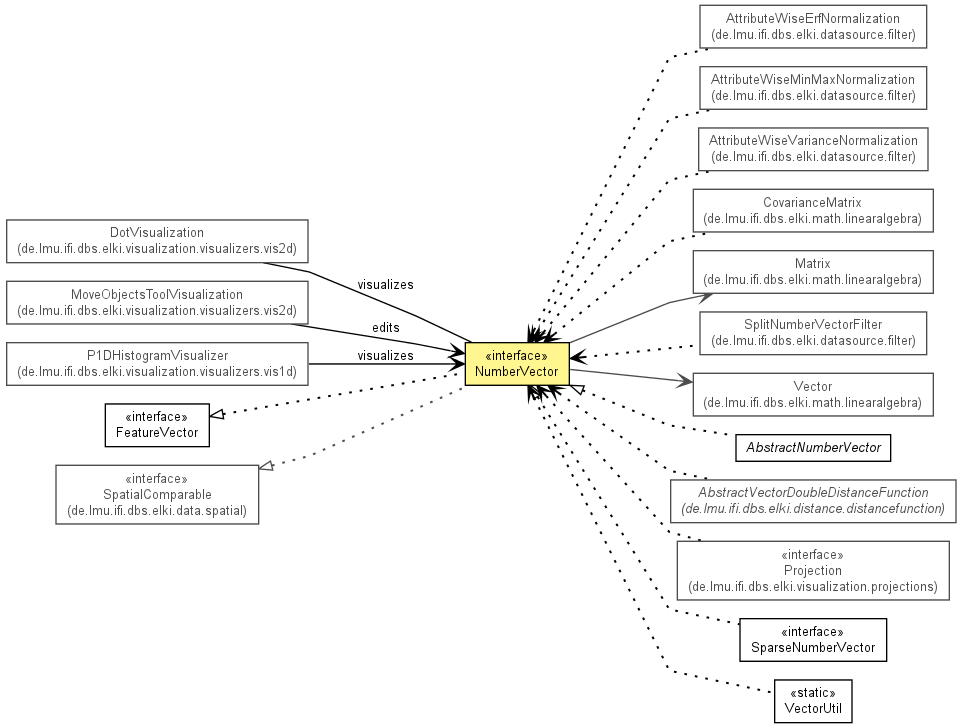| Overview | Package | Class | Use | Tree | Deprecated | Index | Help |

|

|
|||||||||
| PREV CLASS NEXT CLASS | FRAMES NO FRAMES | |||||||||
| SUMMARY: NESTED | FIELD | CONSTR | METHOD | DETAIL: FIELD | CONSTR | METHOD | |||||||||
V - the type of NumberVector implemented by a subclassN - the type of the attribute valuespublic interface NumberVector<V extends NumberVector<? extends V,N>,N extends Number>

Interface NumberVector defines the methods that should be implemented by any Object that is element of a real vector space of type N.
| Method Summary | |
|---|---|
byte |
byteValue(int dimension)
Returns the value in the specified dimension as byte. |
double |
doubleValue(int dimension)
Returns the value in the specified dimension as double. |
float |
floatValue(int dimension)
Returns the value in the specified dimension as float. |
Vector |
getColumnVector()
Returns a Vector representing in one column and getDimensionality() rows the values of this NumberVector of V. |
Matrix |
getRowVector()
Returns a Matrix representing in one row and getDimensionality() columns the values of this NumberVector of
V. |
int |
intValue(int dimension)
Returns the value in the specified dimension as int. |
long |
longValue(int dimension)
Returns the value in the specified dimension as long. |
V |
minus(V fv)
Returns a new NumberVector of V that is the sum of this NumberVector of V and the negativeVector() of given NumberVector of V. |
V |
multiplicate(double k)
Returns a new NumberVector of V that is the result of a scalar multiplication with the given scalar. |
V |
negativeVector()
Returns the additive inverse to this NumberVector of V. |
V |
newInstance(double[] values)
Returns a new NumberVector of N for the given values. |
V |
newInstance(Vector values)
Returns a new NumberVector of N for the given values. |
V |
nullVector()
Provides a null vector of the same Vector Space as this NumberVector of V (that is, of the same dimensionality). |
V |
plus(V fv)
Returns a new NumberVector of V that is the sum of this NumberVector of V and the given NumberVector of V. |
N |
scalarProduct(V fv)
Provides the scalar product (inner product) of this NumberVector of V and the given NumberVector of V. |
short |
shortValue(int dimension)
Returns the value in the specified dimension as short. |
| Methods inherited from interface de.lmu.ifi.dbs.elki.data.FeatureVector |
|---|
getDimensionality, getValue, newInstance, newInstance, toString |
| Methods inherited from interface de.lmu.ifi.dbs.elki.data.spatial.SpatialComparable |
|---|
getDimensionality, getMax, getMin |
| Method Detail |
|---|
double doubleValue(int dimension)
getValue(dim).doubleValue(), but usually this is much more
efficient due to boxing/unboxing cost.
dimension - the desired dimension, where 1 ≤ dimension ≤
this.getDimensionality()
float floatValue(int dimension)
getValue(dim).floatValue(), but usually this is much more efficient
due to boxing/unboxing cost.
dimension - the desired dimension, where 1 ≤ dimension ≤
this.getDimensionality()
int intValue(int dimension)
getValue(dim).intValue(), but usually this is much more efficient
due to boxing/unboxing cost.
dimension - the desired dimension, where 1 ≤ dimension ≤
this.getDimensionality()
long longValue(int dimension)
getValue(dim).longValue(), but usually this is much more efficient
due to boxing/unboxing cost.
dimension - the desired dimension, where 1 ≤ dimension ≤
this.getDimensionality()
short shortValue(int dimension)
getValue(dim).shortValue(), but usually this is much more efficient
due to boxing/unboxing cost.
dimension - the desired dimension, where 1 ≤ dimension ≤
this.getDimensionality()
byte byteValue(int dimension)
getValue(dim).byteValue(), but usually this is much more efficient
due to boxing/unboxing cost.
dimension - the desired dimension, where 1 ≤ dimension ≤
this.getDimensionality()
Vector getColumnVector()
getDimensionality() rows the values of this NumberVector of V.
getDimensionality() rows the values of this
NumberVector of VMatrix getRowVector()
getDimensionality() columns the values of this NumberVector of
V.
getDimensionality() columns the values of this
NumberVector of VV nullVector()
V negativeVector()
V plus(V fv)
fv - a NumberVector of V to be added to this NumberVector of V
V minus(V fv)
fv - a NumberVector of V to be subtracted to this NumberVector of V
N scalarProduct(V fv)
fv - the NumberVector of V to compute the scalar product for
V multiplicate(double k)
k - a scalar to multiply this NumberVector of V with
V newInstance(double[] values)
values - the values of the NumberVector
V newInstance(Vector values)
values - the values of the NumberVector
|
|
|||||||||||
| PREV CLASS NEXT CLASS | FRAMES NO FRAMES | |||||||||||
| SUMMARY: NESTED | FIELD | CONSTR | METHOD | DETAIL: FIELD | CONSTR | METHOD | |||||||||||